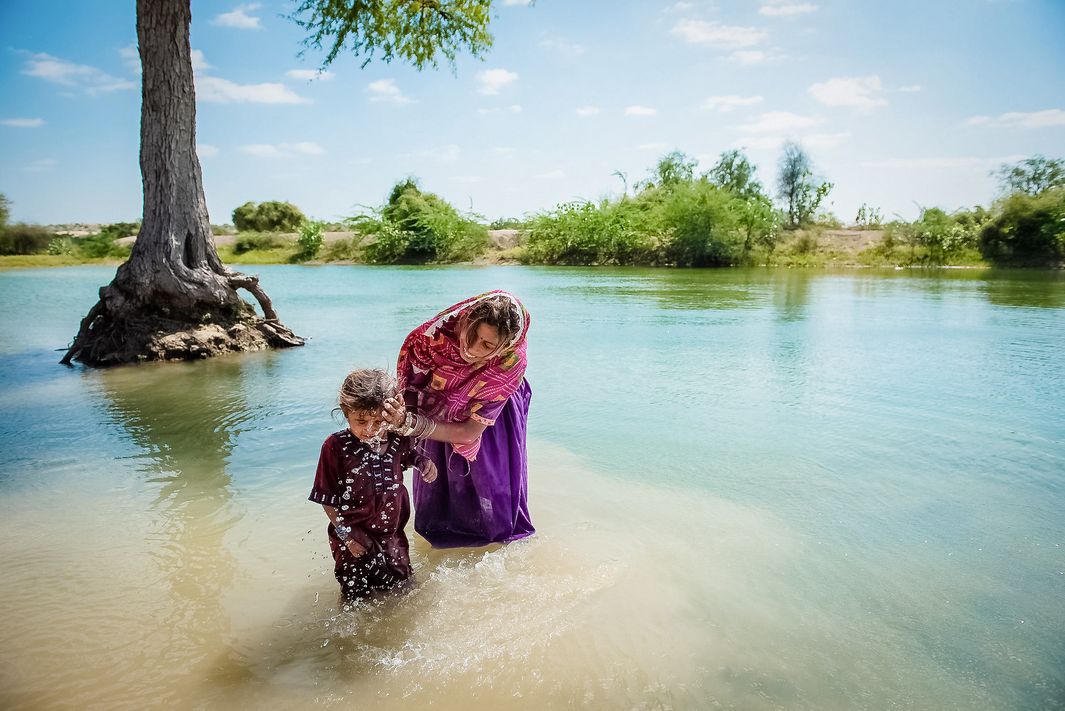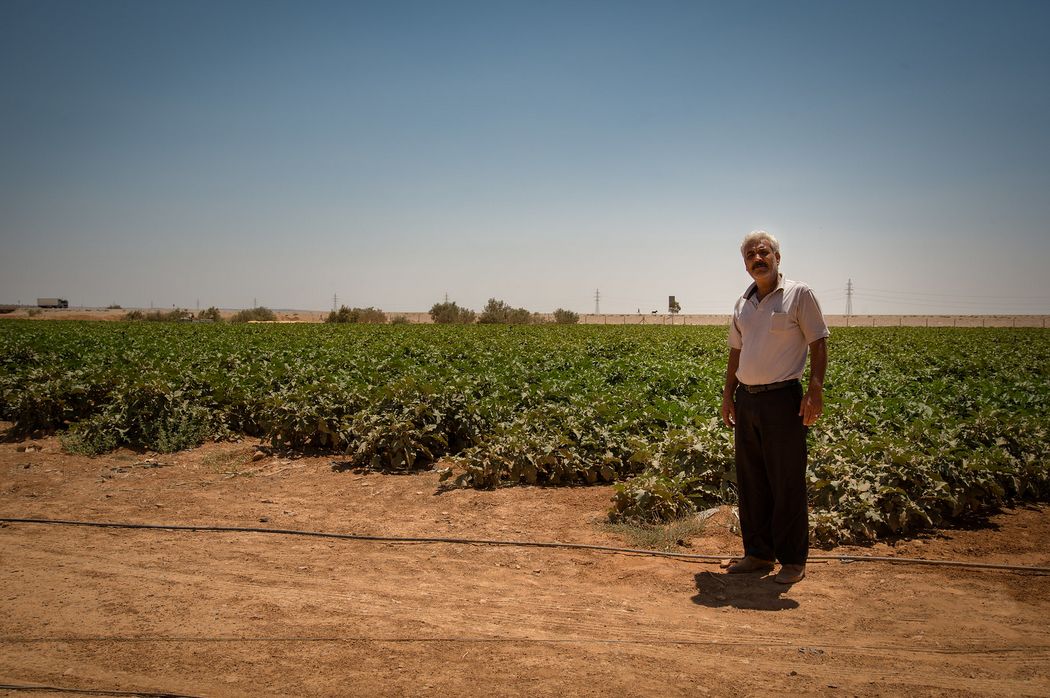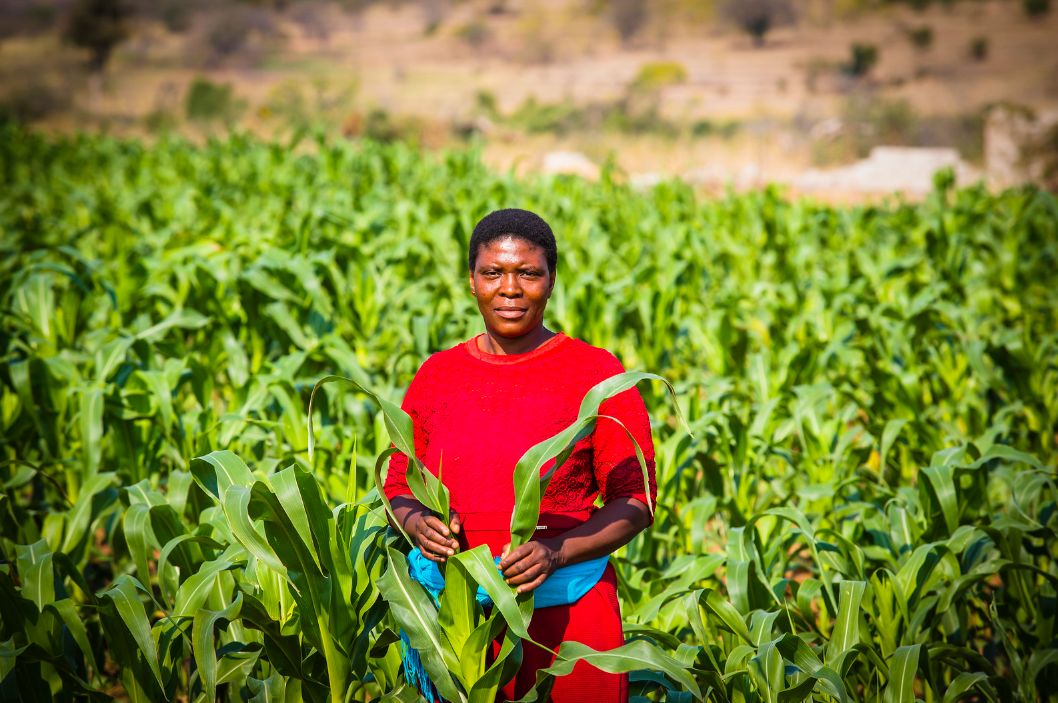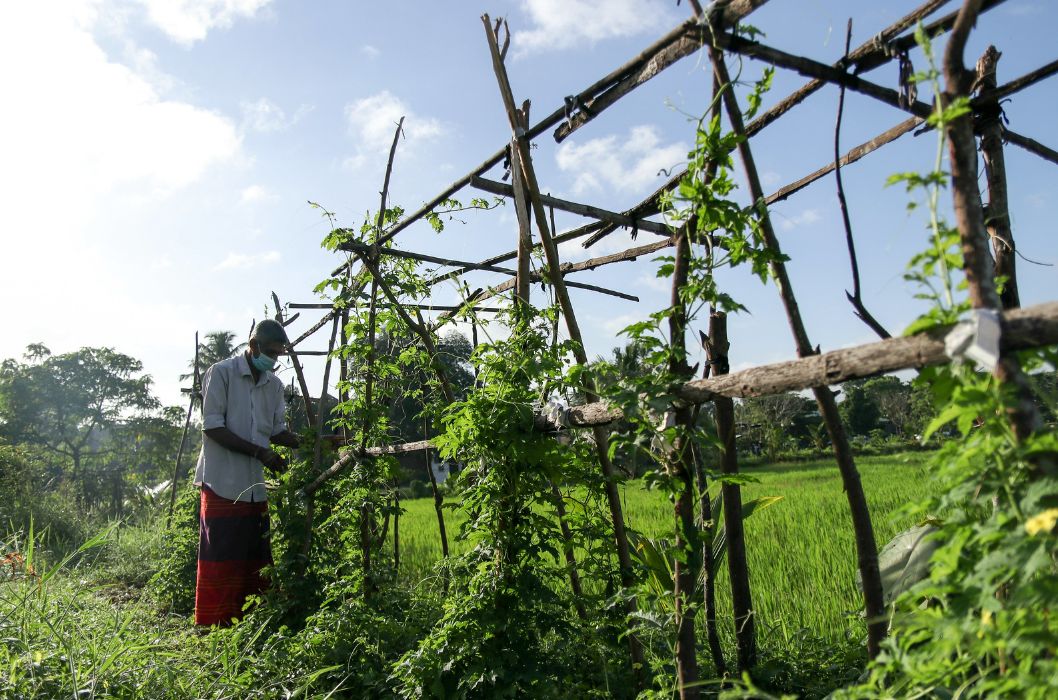By Eleanor Ross and Isis Palay

At the end of 2020, few thought it possible that 2021 could be quite as intense, throwing surprises, challenges, and opportunities at us left, right, and center. But throughout an unpredictable 2021, IWMI and partners have remained steadfast in our work, fully embracing one unexpected situation after another with tenacity, skill, and enthusiasm. Let’s take a look back at the some of our many highlights from the past year.
Exploring the deep connectivity between water and climate at COP26
A major highlight for IWMI in 2021 was our robust participation in the COP26 climate summit, which took place in Glasgow during the first two weeks of November. We collaborated with more than 30 organizations from across the water sector to launch the first-ever Water and Climate Pavilion, which served as a hub of invigorating water-themed programming throughout the summit.
Overall, IWMI experts participated in or led more than 40 events staged either at the Water and Climate Pavilion or other COP26 venues, engaging audiences as speakers, panelists, or moderators. Our prominence at COP26 allowed IWMI, along with other core partners of the Water and Climate Pavilion, to inform and shape conversations throughout the summit, positioning water front and center within broader debates about strengthening climate adaptation, mitigation, and resilience.
“It’s all about water,” noted IWMI Director General Mark Smith from Glasgow. “The agenda that we work on at IWMI, the interest in it, and the demand for it, is only growing.”
Exciting new projects prioritize water security, climate resilience, and social inclusion
This year, IWMI and World Bank teamed up to launch the Accelerating Impacts of CGIAR Climate Research for Africa (AICCRA) Zambia Accelerator Grant to rapidly scale up climate science support for the country’s farming and agriculture sectors. The project aims to fund small- and medium-sized agribusinesses that are working to provide actionable climate information services or climate-smart agriculture innovations at scale, with businesses working on off-grid solar irrigation, integrated aquaculture-agriculture systems, climate-smart seed varieties, or enhancing gender and social inclusion will receive grants of up to USD$50,000 to further their work.
Looking forward, IWMI also recently secured funding for two major projects – each worth USD$6.8 million, thanks to support from the Government of the United Kingdom’s Foreign, Commonwealth & Development Office (FCDO) – that promise to significantly strengthen the positioning of our work on climate change in the years ahead.
The first of these projects, FCDO Al Murana, is focused on building climate resilience by enhancing water security across the Middle East and North Africa (MENA) region through the integration of nature-based solutions for water and improved agricultural water management. Implemented in partnership with IUCN, this project will be led by IWMI’s Matthew McCartney.

The second FCDO-funded project is Water Resource Accountability in Pakistan (WRAP) Component 1. This project will strengthen the governance of water at both the national and provincial levels, while supporting adaptation to climate change and improving environmental sustainability. Moreover, WRAP will prioritize inclusion, with specific plans to engage women, youth, and marginalized people. This five-year project will be led by IWMI’s Mohsin Hafeez.
New research, reports, and papers illuminate pathways toward a more water-secure world
IWMI produced and co-produced a great deal of research during the past 12 months. IWMI’s Aditi Mukherji was named Coordinating Lead Author of the U.N. Intergovernmental Panel on Climate Change (IPCC) Working Group II report chapter on water, for example, and also served as a core writing team member of IPCC AR6 Synthesis Report. Both reports drilled down into key questions put forward by the IPCC WGI report, covering a wide range of topics including water extraction for irrigation, increased frequency of extreme weather events, and the impact of decreased soil moisture levels on overall soil health.
Other recent significant work and research of note:
- IWMI completed national and regional drought risk profiles for 16 countries as part of work funded by the World Bank. These knowledge products will assist development partners and regional/national governments to develop medium- to long-term strategies for climate investments.
- In the World Water Council’s Water Policy journal, “Social change innovations, citizen science, miniSASS, and the SDGs” explored how environmental behaviors could be modified to accelerate progress toward achievement of the Sustainable Development Goals. The paper highlights both successes and failures, and finds that citizen science and co-engaged action learning are viable strategies.
- Frontiers in Environmental Science published “Mapping land suitability for informal, small-scale irrigation development using spatial modelling and machine learning in the Upper East Region, Ghana,” showcasing IWMI researchers’ development of new applications for machine learning, remote-sensing, and spatial modeling – demonstrating that technical innovations, combined with smart governance solutions, can help us make strides toward a more food- and water-secure world.
- A new report also published in Frontiers in Environmental Science, found that without formal operating rules, new hydroelectric infrastructure on large, complex transboundary river basins can have negative impacts. This study – focusing on Ghanaian dams – highlights and quantifies how transboundary cooperation can benefit development and avoid conflict.
Making a splash at World Water Week, Africa Water and Sanitation Week, and Pakistan Water Week

With the pandemic ever-present throughout the year, several major water conferences IWMI participated in were either held in a hybrid in-person/virtual format, or staged entirely virtually. Stockholm World Water Week was conducted entirely online in late August, for example, but this did not stop IWMI experts from getting involved with more than 30 sessions throughout the conference. Organized under the theme “Building Resilience Faster,” this year’s World Water Week took place just weeks following the release of the IPCC Working Group 1 report, which warned of a looming ‘code red’ for humanity and added a sense of urgency to the proceedings. (Click here to review some of IWMI’s key takeaways from the 2021 edition of World Water Week.)
Later in the year, IWMI participated in Africa Water and Sanitation Week, which like Stockholm World Water Week, was held in a fully virtual format. The conference was a major success with 3,000 participants taking part. IWMI was involved in 16 sessions, with several events focusing on groundwater’s untapped potential to serve as potent source of climate resilience in the years ahead.
Last but certainly not least, IWMI was also intimately involved with Pakistan Water Week, which was jointly organized by IWMI, the CGIAR Research Program on Water, Land, and Ecosystems, and Pakistan’s Ministry of Science and Technology, through the Pakistan Council of Research in Water Resources. Organized under the theme of “Needs for Sustainable Water Management in a Climate Crisis for the Indus Basin,” the conference generated significant media attention, and was attended by President Arif Alvi.
IWMI puts its muscle behind the ongoing One CGIAR transformation
Beyond 2021’s major water conferences, IWMI contributed to the One CGIAR transformation process, which gained steam throughout the year. Among other contributions, we participated in the design of 19 One CGIAR initiatives.
IWMI is leading two of these initiatives – Nexus Gains: Realizing Multiple Benefits Across Water, Energy, Food, and Ecosystems, and Ukama Ustawi (U2) Diversification for Resilient Agribusiness Ecosystems in East and Southern Africa – and co-leading five. These initiatives were announced at the U.N. Food Systems Summit (UNFSS) 2021 Pre-Summit, and seek to advance the transformation of food, land, and water systems so that these systems may become more sustainable and thrive in the midst of a climate crisis.
IWMI’s participation in these initiatives showcases our steadfast commitment to a unified and impactful One CGIAR in the years to come, and these initiatives allow CGIAR to “build on its 50-year track record of research and innovations that have changed the world, improving food and nutrition security for the world’s most vulnerable people and lifting millions out of poverty.”
IWMI garners valuable media coverage
Throughout the year, IWMI generated significant attention from media outlets around the world, providing us with ample platforms to broaden and deepen the reach of our expertise and showcase our innovative research for development.

Some of the highlights include:
- Diplomatic Courier published a call to action from IWMI’s Mark Smith, who reminded readers that “climate change is water change – and it is bringing with it the threat of famine, insecurity, and conflict” while calling for greater evidence-based decision-making on water-related issues.
- News First promoted Stanford University’s new report which recently placed 24 scientists working for Sri Lankan institutions on the list of top 2% world’s best scientists. Amongst these 24 researchers are two IWMI experts: Vladimir Smakhtin and Stefan Uhlenbrook.
- News 24 published IWMI’s Inga Jacobs-Mata’s views on South Africa’s preparedness for the next drought. “It is definitely going to happen again and we need to know how we are preparing for this,” she warned, with regard to the potential for acute water shortages in the country’s future. “We are going to run out of water.”
- The Financial Times interviewed Giriraj Amarnath as part of its coverage of the delayed monsoon in India, which has jeopardized the country’s economic recovery after agricultural production crashed in 2020.
- Daily Mirror and Times Online both published articles on IWMI’s successful hi-tech solutions for farmers exposed to water risks and disasters, exploring how our bundled solutions allow farmers to receive insurance payouts for crop damage caused by excess rain or dry spells.
- Daily Pakistan and The Nation highlighted IWMI researchers’ talks at the 5th Karachi International Water Conference, with Mohsin Hafeez’s insights on water reuse in Pakistan reflecting Pay Drechsel’s findings on how a circular economy can help strengthen urban sanitation systems.
The power of partnership
In 2021, IWMI helped formally launch the Water Resilience Assessment Framework (WRAF) in partnership with CEO Water Mandate, Pacific Institute, Alliance for Global Water Adaptation, and World Resources Institute. WRAF will help inform decision-making among water stakeholders across the globe to enhance short- and long-term resilience in our water systems. After all, “water resilience is both art and science,” notes IWMI’s Mark Smith. “We need to bring to bear technical and institutional capabilities that meet the social, technological, and innovation challenges of resilience…. [and] the WRAF promises a reference point of data and measurement to make this process more successful.”
This year IWMI also added our signature to the U.N. Global Compact, which commits signatories to abiding by the Sustainable Development Goals and living the Ten Principles. Core values embodied in these principles include operating in a fair way and developing a culture of integrity.
Looking ahead to 2022
The fact that IWMI achieved so much throughout a year dominated by the pandemic and lockdowns is a testament to the dedication of our staff and partners around the world. If we can achieve that level of output and impact amidst all the challenges of the past 12 months… just imagine what next year will bring!
To learn more, we invite you to explore our website to gain a better understanding of how IWMI is helping lay the foundation for a more water-secure and climate-resilient world.

